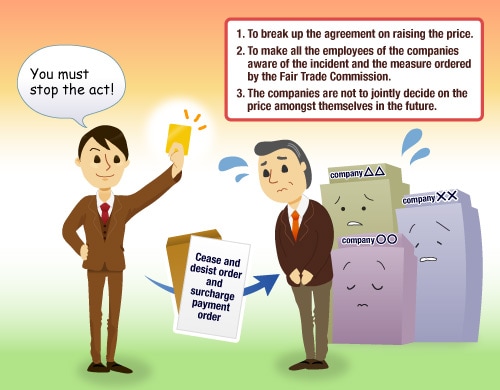- Home
- Yellow card for violations of the rules!
- What kinds of activities does it conduct?
- Cease and desist order and surcharge payment order
text body
Cease and desist order and surcharge payment order
A company or store that has committed an act in violation of the rules is ordered to promptly stop the act and take the measures necessary to reinstate competition in the market. This administrative disposition is called a "cease and desist order." A company or store that has formed a cartel or conducted bid-rigging, private monopolization and certain types of unfair trade practices is ordered to pay the national treasury a surcharge. This administrative disposition is called a "surcharge payment order."

As you can see in the above illustration, or an example of a cartel, the companies are ordered to cancel the agreement on raising the price, make all their employees aware of the incident and the measures ordered by the Fair Trade Commission, and take measures for preventing a recurrence. They are ordered to pay the national treasury a surcharge to disgorge the unreasonable profits obtained through the violation. The amount of the surcharge is calculated on a certain ratio.
A company or store that does not comply with the finalized cease and desist order is subject to criminal penalties.
A company or store that does not comply with the finalized cease and desist order is subject to criminal penalties.






global navigation